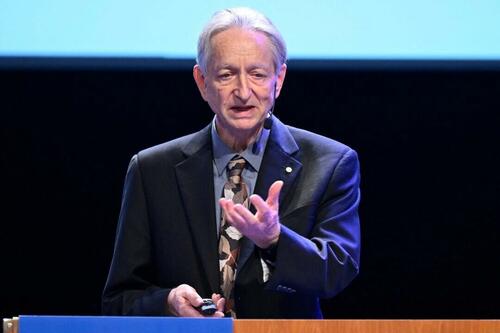Authored by Tom Ozimek via The Epoch Times,
Geoffrey Hinton, the pioneering computer scientist called the “Godfather of AI,” has once again sounded the alarm that the very technology he helped bring to life could spell the end of humanity as we know it.
In an interview clip released Aug. 18 as part of the forthcoming film “Making God,” Hinton delivered one of his starkest warnings yet. He said that humanity risks being sidelined—and eventually replaced—by machines far smarter than ourselves.
“Most people aren’t able to comprehend the idea of things more intelligent than us,” Hinton, a Nobel prize-winner for physics and a former Google executive, said in the clip.
“They always think, well, how are we going to use this thing? They don’t think, well, how’s it going to use us?”
Hinton said he is “fairly confident” artificial intelligence will drive massive unemployment, pointing to early examples of tech giants like Microsoft replacing junior programmers with AI. But the larger danger, he said, goes far beyond the workplace.
“The risk I’ve been warning about the most … is the risk that we’ll develop an AI that’s much smarter than us, and it will just take over,” Hinton said.
“It won’t need us anymore.”
The only silver lining, he joked, is that “it won’t eat us, because it’ll be made of silicon.”
From Breakthroughs to Regrets
Hinton, 77, has spent decades pioneering deep learning, the neural network architecture that underpins today’s artificial intelligence systems. His breakthroughs in the 1980s—particularly the invention of the Boltzmann machine, which could learn to recognize patterns in data—helped open the door to image recognition and modern machine learning.
That work earned him the 2024 Nobel Prize in Physics, awarded “for foundational discoveries and inventions that enable machine learning with artificial neural networks.”
The Royal Swedish Academy of Sciences noted how Hinton’s early use of statistical physics provided the conceptual leap that made today’s AI revolution possible.
But Hinton has since emerged as one of the field’s fiercest critics, warning that its rapid development has outpaced society’s ability to keep it safe. In 2023, he resigned from his role at Google so he could speak freely about the risks without implicating the company.
In his Nobel lecture, Hinton acknowledged the potential benefits of AI—such as productivity gains and new medical treatments that could be a “wonderful advance for all humanity.” Yet he also warned that creating digital beings more intelligent than humans poses an “existential threat.”
“I wish I’d thought about safety issues too,” he said during the recent Ai4 conference in Las Vegas, reflecting on his career. He added that he now regrets solely focusing on making AI work, rather than anticipating its risks.
Teaching AI to Care
Hinton has previously estimated there is a 10 to 20 percent chance that AI could wipe out humanity. In a June episode of The Diary of a CEO podcast, he said that the engineers behind today’s AI systems don’t fully understand the technology and broadly fall into two camps: one that believes in a dystopian future where humans are displaced, and the other, dismissing such fears as science fiction.
“I think both of those positions are extreme,” Hinton said.
“I often say 10 percent to 20 percent chance [for AI] to wipe us out. But that’s just gut, based on the idea that we’re still making them and we’re pretty ingenious. And the hope is that if enough smart people do enough research with enough resources, we’ll figure out a way to build them so they’ll never want to harm us.”
At the Las Vegas conference last week, Hinton offered a novel idea for how to mitigate the danger: instead of trying to force AI systems into submission, researchers should design them with “maternal instincts” so they would want to protect humans even as they grow smarter.
“The right model is the only model we have of a more intelligent thing being controlled by a less intelligent thing, which is a mother being controlled by her baby,” Hinton said at the conference.
“They’re going to be much smarter than us,” Hinton warned, adding that “the only good outcome” is if they care about humanity the way a mother regards her child.
“If it’s not going to parent me, it’s going to replace me.”
